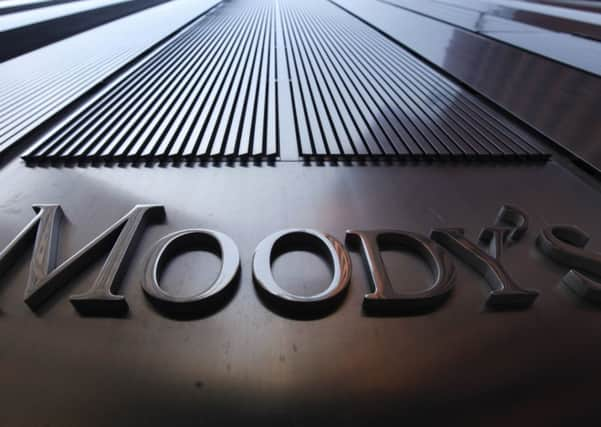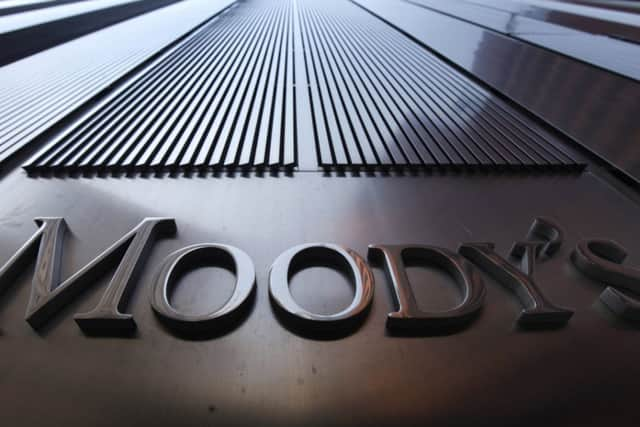Scotland’s credit ‘will be on par with Botswana’


The agency said in a report yesterday that an “A” rating, the same as Estonia and Botswana, is the most likely at the outset but could be lower. But it said that over time, greater clarity and confidence about Scotland’s institutional structure could make higher rating levels attainable.
The credit impact to the remainder of the UK (rUK) is likely to be limited, given the small size of Scotland’s economy relative to rUK. But Moody’s said this could change if Scotland refuses to assume a “fair and proportionate share” of its debt obligations.
Advertisement
Hide AdAdvertisement
Hide AdThis would mean rUK’s net debt burden would increase, a situation that would be “credit negative”.


A low credit rating is significant because it means a government – in this case at Holyrood – has to pay more to borrow funds from international banks.
This in turn could have an impact both on company debt in Scotland and personal debt, such as home mortgages.
First Minister Alex Salmond plans to be part of a sterling zone with rUK after independence.
Chancellor George Osborne has ruled out a currency union with an independent Scotland.
Moody’s said that if Scotland adopted its own currency, this would be “credit neutral” for rUK. But if Scotland were to share the pound, this would weaken rUK’s rating.
The report concluded: “If Scotland were to retain the pound sterling as its currency and the Bank of England as its central bank, this would be credit negative for the remainder of the UK, regardless of the institutional arrangements that are put in place.
“This would be particularly true if an independent Scotland were not also subject to binding fiscal co-ordination and banking union with the remaining UK.”
Advertisement
Hide AdAdvertisement
Hide AdThe assessment was dismissed by the Scottish Government. It said that “year-on-year, Scotland is in a stronger financial position than the UK as a whole”.
In February, global ratings firm Standard & Poor’s said that the challenges facing an independent Scotland’s economy would be significant but not insurmountable.
But opponents of independence claimed the Moody’s report was a “devastating” blow for the nationalists.
Former Labour chancellor and Better Together leader Alistair Darling said: “This is an absolutely devastating report for the nationalists. Not only does it completely undermine everything they have been asserting about currency, it also makes clear that if we leave the UK, then we would pay more for our mortgages, credit cards and loans. This is the real cost of independence.”
Liberal Democrat Chief Secretary to the Treasury Danny Alexander added: “Only weeks ahead of the most detailed analysis of the fiscal implications for independence being published, this is more evidence we are better off together – with a strengthening economy, jobs being created and a deficit that is falling.
“As part of the UK, Scotland can avoid a double downgrade for its credit rating and maintain lower borrowing costs for Scottish businesses and families.
“Moody’s also confirms why the UK should not join a currency union – because it would then also have a weaker credit rating. Together as the UK we are all better off.”
But a spokesman for finance secretary John Swinney said Scotland would be in a stronger position than rUK after independence.
Advertisement
Hide AdAdvertisement
Hide AdHe said: “An independent Scotland will be the 14th-wealthiest country per head in the developed world, compared to the UK in 18th place, and Standard & Poor’s recently made clear that – even without North Sea oil – an independent Scotland will qualify for their ‘highest economic assessment’.
“The Westminster government are just about the last people who should be attempting to make political capital on credit ratings, given that the No campaign’s previous boasts came unstuck when the UK was stripped of its AAA status by international agencies, while other, smaller European nations retained a top rating.”
He added: “Indeed, almost two-thirds of the countries deemed to have AAA status by Standard & Poor’s have a population of less than ten million.
“Year-on-year, Scotland is in a stronger financial position than the UK as a whole. And Scotland’s public sector debt is lower than the UK’s, and lower than the EU and G7 average, confirming our underlying economic strength.”
SEE ALSO